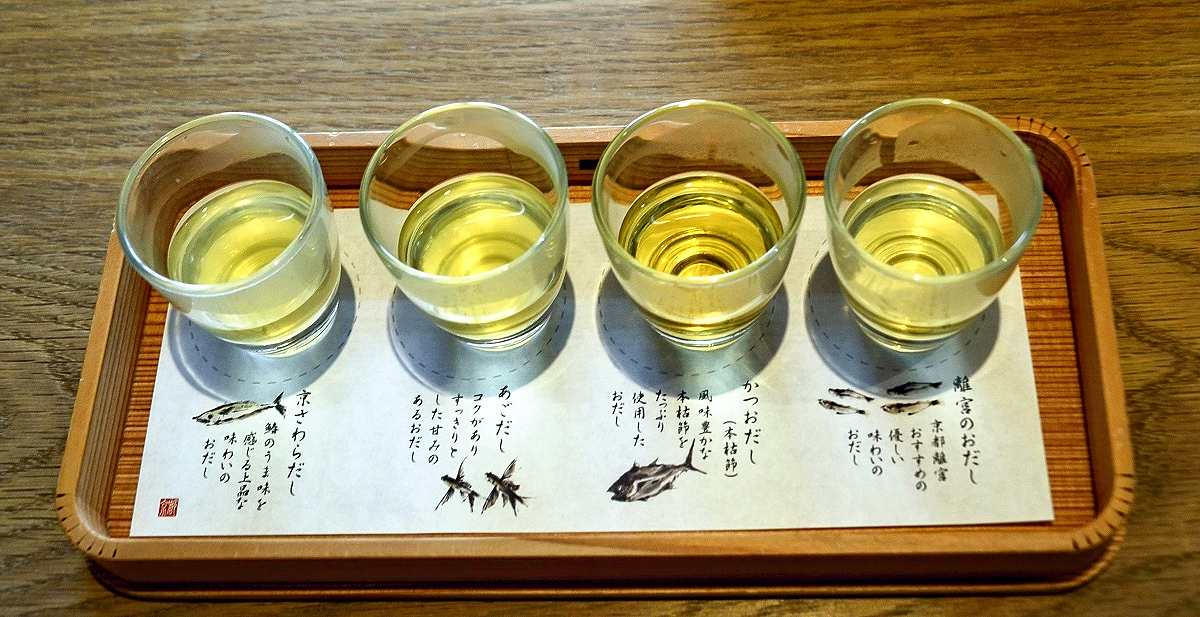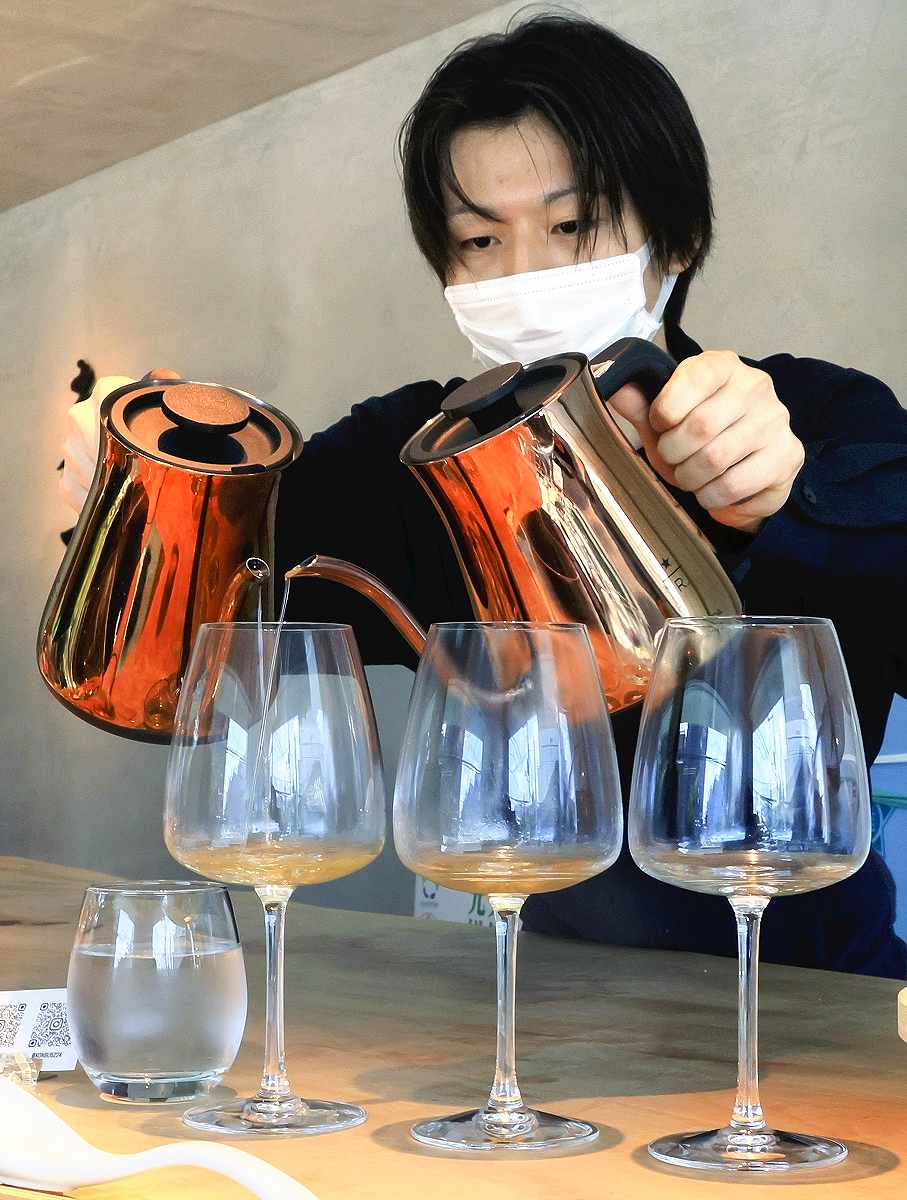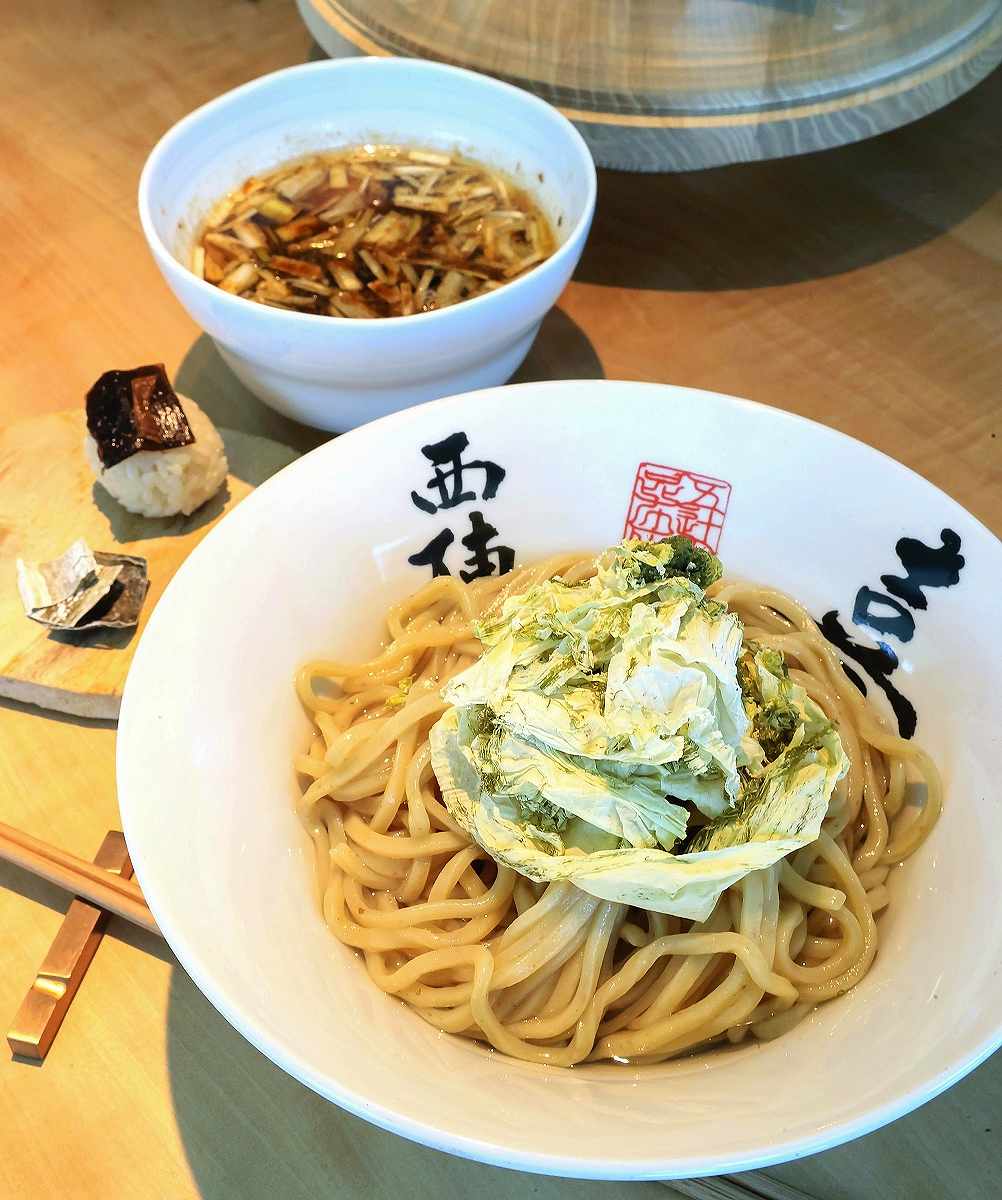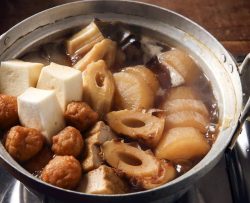
After tasting four varieties of the broth, customers enjoy dashimaki tamago, dashi rolled omelet, with their favorite dashi at Kyoto Rikyu Odashi To Dashimaki in Kyoto’s Fushimi Ward.
16:00 JST, July 14, 2024
Dashi is a base cooking broth featuring umami flavor that adds richness and depth to Japanese cuisine. While fewer households these days spend time making traditional foods because of the westernization of the nation’s diet, restaurants serving dashi in unique ways and tours to special grocery stores in markets are drawing increased interest.
These are just two examples of efforts being made to help the public rediscover the appeal of dashi.
Time to have a taste

Kombu To Men Kiichi ramen restaurant serves glasses of dashi for customers to taste test in Kamigyo Ward, Kyoto, on June 7.
Three glasses appear to hold white wine, but they don’t.
“Starting on the right, kombu- and katsuo-based dashi and [one glass] with a mixture of the two. Give each of them a taste,” a food server says.
The ramen shop Kombu To Men Kiichi in Kamigyo Ward, Kyoto, serves glasses of dashi before meals. Customers who tasted them on June 7 at the counter there voiced their astonishment, saying the dashi smells good and pointing out the vast difference in flavor when the two are combined.
The restaurant serves only one kind of ramen, which substitutes for tsukemen, or dipping ramen noodles, between May and October. The way ramen is consumed there adds to the uniqueness of the restaurant.

Customers enjoy tsukemen with only kombu dashi first and dipping soup served later at Kombu To Men Kiichi.
First, simply eat after mixing noodles soaked in kombu dashi, shredded kombu and chopped kombu in a bowl. While customers might be satisfied enough with the dish, the restaurant also offers a dipping soup featuring saba-bushi, or dried mackerel, and dried sardines called niboshi.
The server recommends tasting the rest of the dipping soup by pouring the dashi into the bowl in a soba-yu style.
“Comparing different dashi is interesting, and I found the dashi deeply fascinating,” said a 37-year-old Nagoya-based musician who visited the restaurant.
The ramen shop only produces 30 servings daily, and since opening in April last year, it has been booked full almost every day. One of the creators is Akito Kuse, 43, a fifth-generation proprietor of the kombu shop Itsutsuji No Kombu in Kyoto.
While the production volume of kombu in Hokkaido makes up 90% of the domestic market share, annual production has recently slumped to around 10,000 tons. That’s a dip of 70% over about a 30-year span that has seen the price increase amid climate change and other factors.
While alternatives such as powdered dashi are available, Kuse has embarked on this new business with the intention of encouraging the public to rediscover the value of kombu by showing it to them.
Meanwhile at Kyoto Rikyu Odashi To Dashimaki, a Japanese restaurant, in Kyoto’s Fushimi Ward, visitors can taste four kinds of dashi, such as flying fish and Japanese Spanish mackerel, in shot glasses and they can savor Dashimaki Gozen, dashi rolled omelet meal, with their favorite dashi.
A company that operates Japanese eateries started the restaurant, labeled a dashi theme park, in August 2022 because its main patrons were aging. The customers who frequent the restaurant now are mainly women in their 40s and 50s.
“We stay filled up because younger people, who respond to our elements of entertainment, are coming to the restaurant,” said 39-year-old Tomomi Miyanaga, who is in charge of public relations for the restaurant.
“While fewer people make dashi from dried food, we would like to convey to customers the appeal of dashi through the authentic taste of dashi.”
Takeshi Kadokami, a 71-year-old food columnist, pointed out the reason why dashi draws more attention these days, saying the change has come since UNESCO added Japanese cuisine to the Intangible Cultural Heritage list in 2013.
“More and more people have been motivated to know and learn about dashi over the past 30 years,” he said.
Plenty of fun in store
There is a guided tour that focuses on how to use dashi. OMO 7 Osaka by Hoshino Resort, a hotel in Naniwa Ward, Osaka, that opened in April 2022, offers guided tours for guests.
The guide takes guests around to shops such as grocery stores selling dried food in Osaka Kizu Wholesale Market, and visitors can learn about the varieties of dashi and how to make broth from them.
The tour is available whenever the market is open.
“Some participants buy kombu and shaved dried bonito to use at their homes. I hope to convey the dashi culture of the Kansai region to people from overseas,” said Kae Yasoda, a 51-year-old guide.
Nowadays, young people who don’t favor Japanese cuisine are noticeable. A survey of men and women between ages 20 and 69 conducted by the Agriculture, Forestry and Fisheries Ministry in 2020 shows that while less than 10% of men and women in their 60s said they don’t like Japanese cuisine, 34.3% of men in their 20s said the same thing.
In addition, a survey conducted last year said that passing along Japanese food culture has become challenging, with 74.6% of all the respondents saying they hadn’t been afforded opportunities to learn about or have the food culture passed down to them at all.
The Japanese Culinary Academy, a non-profit organization comprising cooks and others in the food industry, provides nutrition education to elementary schools and universities by sending cooks to demonstrate how to make dashi and having participants taste it.
“I want young generations to experience the umami flavor in dashi and know how good Japanese cuisine is so that the culture of Japanese food will be passed down,” said the director of the organization, Toru Fushiki, who is also the president of Koshien University.
Top Articles in Features
-

Tokyo’s New Record-Breaking Fountain Named ‘Tokyo Aqua Symphony’
-

Sapporo Snow Festival Opens with 210 Snow and Ice Sculptures at 3 Venues in Hokkaido, Features Huge Dogu
-

Tourists Flock to Ice Dome Lodge at Resort in Hokkaido, Japan; Facility Invites Visitors to Sleep on Beds Made of Ice
-

High-Hydration Bread on the Rise, Seeing Increase in Specialty Shops, Recipe Searches
-

Heirs to Kyoto Talent: Craftsman Works to Keep Tradition of ‘Kinran’ Brocade Alive Through Initiatives, New Creations
JN ACCESS RANKING
-

Japan PM Takaichi’s Cabinet Resigns en Masse
-

Japan Institute to Use Domestic Commercial Optical Lattice Clock to Set Japan Standard Time
-

Israeli Ambassador to Japan Speaks about Japan’s Role in the Reconstruction of Gaza
-

Man Infected with Measles Reportedly Dined at Restaurant in Tokyo Station
-

Videos Plagiarized, Reposted with False Subtitles Claiming ‘Ryukyu Belongs to China’; Anti-China False Information Also Posted in Japan






















